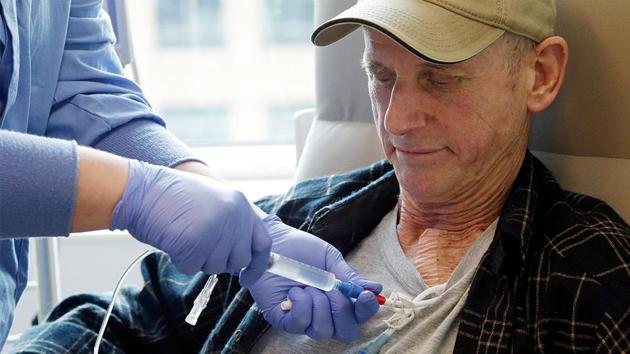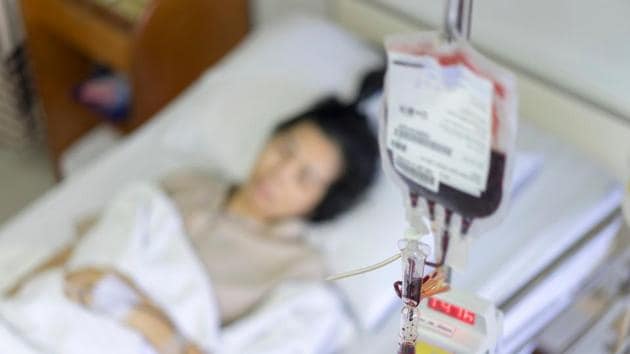Immunotherapy for cancer treatment: Side effects and how it differs from chemotherapy
Although immunotherapy and chemotherapy are both used to treat cancer, there are differences in their modes of action and adverse effects. Which one is better?
Over the past few decades, there have been major advancements in cancer treatment, with more focused and less harmful choices becoming accessible where chemotherapy and immunotherapy are two of the most popular treatments. Although they are both used to treat cancer, there are differences in their modes of action and adverse effects.

What is Immunotherapy?
In an interview with HT Lifestyle, Dr Raman Narang, Senior Consultant - Medical Oncologist at Andromeda Cancer Hospital in Sonipat, simplified that one kind of cancer treatment - called immunotherapy - works by strengthening the body's defenses against cancerous cells. Numerous forms of immunotherapy exist, such as:
- Checkpoint inhibitors: Medication that prevents cancer cells from using "off" signals to evade the immune system.
- CAR-T cell therapy: An intervention that enhances a patient's immune system's capacity to identify and combat cancer.
- Cancer vaccines: Made to elicit an immune response against particular proteins linked to cancer.
Mechanism of Action: Immunotherapy vs. Chemotherapy
According to Dr Raman Narang, the way that immunotherapy and chemotherapy target cancer is where they diverge most -
- Chemotherapy: Chemotherapy targets cancer cells that proliferate quickly. Because they obstruct cell division, these medications are cytotoxic, which means that they cause cell death. It can destroy rapidly dividing healthy and malignant cells found in the blood, gut, and skin. Its negative effects can therefore be more severe and widespread.
- Immunotherapy: This treatment stimulates the body's immune system to identify and combat cancer rather than directly attacking cancer cells. Immunotherapy assists them in identifying cancer cells, which frequently elude the immune system's detection, by stimulating immune cells like T-cells. This approach is more targeted because it only enhances the immune system’s natural response to fight cancer, leaving healthy cells largely unaffected.

Side Effects: Immunotherapy vs. Chemotherapy
Bringing her expertise to the same, Dr Pooja Babbar, Consultant - Medical Oncology at CK Birla Hospital in Gurugram, revealed that patients may encounter varying side effects as a result of the variations in these therapies' mechanisms of action. She elaborated -
- Chemotherapy side effects: Chemotherapy side effects are more common because it affects all quickly dividing cells. Among the typical adverse effects are:
- Exhaustion or fatigue
- Hair loss
- Vomiting and nausea.
- Sores on the mouth - Infections
- Anemia
Chemotherapy side effects can be intense but often subside after treatment ends, as healthy cells recover.
- Immunotherapy side effects: Although immunotherapy is usually more tolerable than chemotherapy, it nonetheless has certain drawbacks. **Immune-related adverse events (irAEs) are side effects that are frequently associated with immune system activity because it stimulates the immune system. Typical adverse effects consist of:
- Exhaustion Immunotherapy can make you fatigued, just like chemotherapy does, although it usually doesn't last as long.
- Skin reactions: Many patients have rashes, itching, or other skin concerns, which are linked to the immune system's activation.
- Inflammation: As the immune system ramps up, it may attack normal tissues, resulting to inflammation in organs such as the liver (hepatitis), lungs (pneumonitis), intestines (colitis), and endocrine glands (thyroiditis).
- Fever and chills: When the immune system becomes active, people may have symptoms similar to the flu, such as body aches
- Autoimmune reactions: In rare cases, the immune system may overreact, attacking healthy organs and tissues, leading to autoimmune diseases.
Immunotherapy side effects might happen weeks or months after the start of treatment and are typically more delayed. Usually treatable with corticosteroids or other immune-suppressive drugs, they can occasionally develop chronic.

Similarities
1. Goal: Both seek to increase patient survival while eradicating cancer cells.
2. Combination: Frequently used in conjunction with radiation or surgery, among other therapies.
3. Monitoring: Both treatments require routine monitoring and follow-ups.
How Should One Make a Decision?
Dr Pooja Babbar highlighted that choosing between immunotherapy and chemotherapy requires careful consideration in consultation with the physician. Considerable elements include -
- Cancer Type and Stage: Depending on how a given cancer responds to chemotherapy and immunotherapy, specific treatment plans are advised.
- Molecular Markers: Certain tumors have markers in their DNA that suggest they will react better to immunotherapy.
- Patient Preferences: Taking into account the lifestyle, tastes, and level of side effect tolerance of the patient.
Dr Pooja Babbar concluded, “There are advantages and disadvantages to both immunotherapy and chemotherapy. A customised approach to therapy should be taken, considering the unique features of the malignancy as well as the patient's preferences and general health. Patients now have more options than ever before to effectively combat cancer because of continual breakthroughs in the field.”
Disclaimer: This article is for informational purposes only and not a substitute for professional medical advice. Always seek the advice of your doctor with any questions about a medical condition.
Catch your daily dose of Fashion, Taylor Swift, Health, Festivals, Travel, Relationship, Recipe and all the other Latest Lifestyle News on Hindustan Times Website and APPs.





